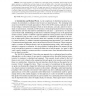917 search results - page 2 / 184 » A Group Based Approach for Coordinating Active Objects |
ISPE
2003
13 years 6 months ago
2003
A two stage approach to co-ordination in a multi-agent society is presented. The first stage involves agents learning to co-ordinate their activities based on local and global uti...
AGENTCL
2003
Springer
13 years 10 months ago
2003
Springer
We propose group communication for agent coordination within “active rooms” and other pervasive computing scenarios featuring strict real-time requirements, inherently unrelia...
ICIP
2007
IEEE
13 years 11 months ago
2007
IEEE
In this paper, we propose a system identification approach for group activity recognition in traffic surveillance. Statistical shape theory is used to extract features, and then...
HICSS
2002
IEEE
13 years 10 months ago
2002
IEEE
We describe an approach to healthcare coordination using object life cycles (OLCs) [1]. By consulting the OLC of a given patient object instance, the legal methods to apply to tha...
FMCO
2004
Springer
13 years 10 months ago
2004
Springer
Abstract. Coordination languages are intended to simplify the development of complex software systems by separating the coordination aspects of an application from its computation ...

